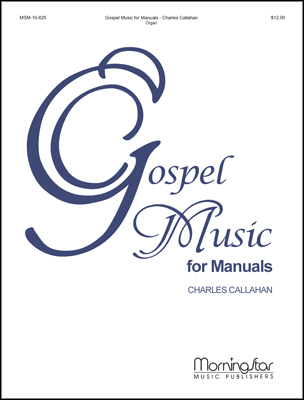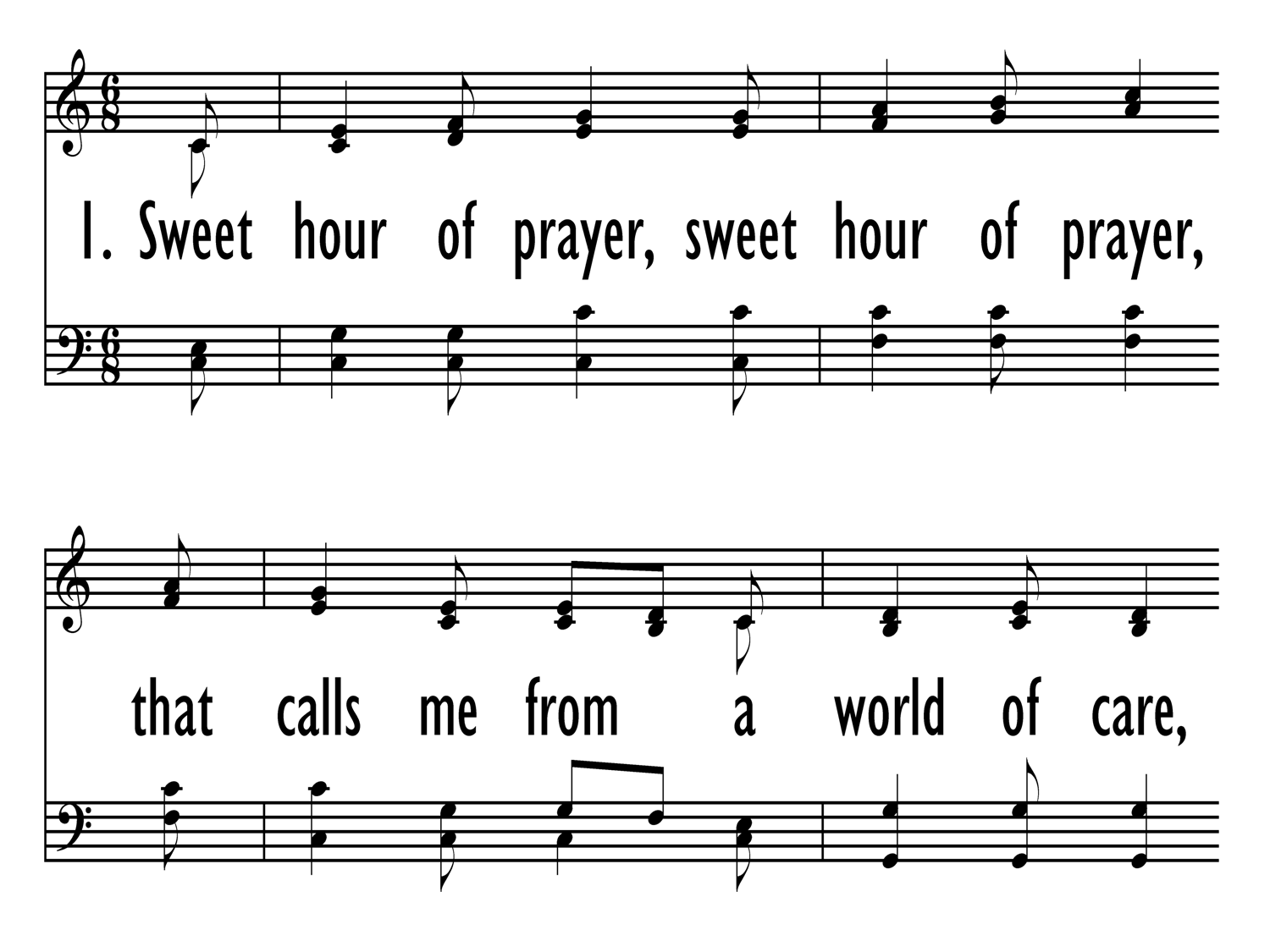- |
User Links
Sweet Hour of Prayer

Sweet hour of prayer, sweet hour of prayer
Author: W. W. Walford (1845)Tune: [Sweet hour of prayer, sweet hour of prayer] (Bradbury)
Prayer Songs
Published in 1308 hymnals
Printable scores: PDFPlayable presentation: Lyrics only, lyrics + musicAudio files: MIDI, Recording
Representative Text
1 Sweet hour of prayer! sweet hour of prayer!
that calls me from a world of care,
and bids me at my Father's throne
make all my wants and wishes known.
In seasons of distress and grief,
my soul has often found relief,
and oft escaped the tempter's snare
by thy return, sweet hour of prayer!
2 Sweet hour of prayer! sweet hour of prayer!
the joys I feel, the bliss I share
of those whose anxious spirits burn
with strong desires for thy return!
With such I hasten to the place
where God my Savior shows his face,
and gladly take my station there,
and wait for thee, sweet hour of prayer!
3 Sweet hour of prayer! sweet hour of prayer!
thy wings shall my petition bear
to him whose truth and faithfulness
engage the waiting soul to bless.
And since he bids me seek his face,
believe his word, and trust his grace,
I'll cast on him my every care,
and wait for thee, sweet hour of prayer!
United Methodist Hymnal, 1989
Author: W. W. Walford
William W. Walford, a blind preacher of England, is the author of the hymn beginning "Sweet hour of prayer." This hymn first appeared in print in the New York Observer September 13, 1845. The contributor who furnished the hymn says: "During my residence at Coleshill, Warwickshire, England, I became acquainted with W. W. Walford, the blind preacher, a man of obscure birth and connections and no education, but of strong mind and most retentive memory. In the pulpit he never failed to select a lesson well adapted to his subject, giving chapter and verse with unerring precision, and scarcely ever misplacing a word in his repetition of the Psalms, every part of the New Testament, the prophecies, and some of the histories, so as to have the r… Go to person page >Text Information
Related Texts
| First Line: | Sweet hour of prayer, sweet hour of prayer |
| Title: | Sweet Hour of Prayer |
| Author: | W. W. Walford (1845) |
| Meter: | 8.8.8.8 D |
| Language: | English |
| Notes: | Swahili translation: See "Wakati wangu kuomba" |
| Copyright: | Public Domain |
| Liturgical Use: | Prayer Songs |
Engish
English
- 112 Familiar Hymns and Gospel Songs #60
- 20th Century Gospel Songs #48
- A Book of Song and Service: for Sunday school and home #22
- A Book of Worship for the Use of the Evangelical Lutheran Church ... of the Church of the Redeemer, Richmond, Virginia #d153
- A Choice Selection of Hymns and Spiritual Songs for the use of the Baptist Church and all lovers of song #553
- A Collection of Choral Hymns for the ... Hanson Place Methodist Episcopal Congregation #d167
- A Collection of Evergreen Hymns, for All the People. New ed. #d133
- A Collection of Hymns and Sacred Songs: suited to both private and public devotions, and especially adapted to the wants and uses of the brethren of the Old German Baptist Church #86
- A Collection of Hymns for Public and Private Devotion #d226
- A Collection of Psalms and Hymns: suited to the various occasions of public worship and private devotion #A4 10 shown out of 884
Hebrew
Korean
Spanish
Welsh
Yiddish
Notes
Sweet hour of prayer, sweet hour of prayer. W. W. Walford. [Prayer.] In Nutter's Hymn Studies, N. Y., 1884, the note to this hymn is "Mr. Butterworth, in his Story of the Hymns, says, 'This hymn was written by Rev. Mr. Walford, an English blind preacher, and was given to the public in 1849.'" Beyond this we have no information except that the hymn is in several American collections, including the Meth. Episcopal Hymnal, 1878, and that the original consists of 4 stanzas of 8 lines. This hymn is given on p. 1204, ii. 52, as by Mrs. Van Alstyne, in error.
--John Julian, Dictionary of Hymnology, Appendix, Part II (1907)
For Leaders
Text:
The author of this hymn is not known for certain. The text is often attributed to a man named W. W. Walford on the basis of an account in the New York Observer by Thomas Salmon in 1845, where the text was first published. This Walford was a blind, uneducated English preacher who had committed huge portions of the Bible to memory. Salmon would have met him between 1838 and 1842 while serving as pastor of a church in Coleshill, England. However, hymnologists have encountered problems in substantiating Walford's identity through church records, and some attribute the hymn to William Walford of Homerton, England, an educated Congregational minister, who was not blind. Traditionally, however, the hymn has been attributed to the blind preacher.
The theme of the text is the joy of spending time in communion with God through prayer. The text has four stanzas, though sometimes the second (“The joys I feel, the bliss I share”) or the fourth (“May I thy consolation share”) is omitted.
Tune:
William Bradbury composed SWEET HOUR for this text in 1861 and published it in his Golden Chain. The tune was named after the text and is the only tune to which this hymn is sung. The tempo should not drag, and the accompaniment should be soft.
When/Why/How:
This hymn may be used before pastoral or congregational prayer as a time of preparation, as a congregational hymn or an instrumental setting. A short and simple setting of “Sweet Hour of Prayer” is found in the “Easy Organ Library, Vol. 50.” Another easy version of “Sweet Hour of Prayer” is for handbells and optional handchimes and is suitable for children’s handbell choirs. It opens by “ringing the hour” like a clock chime. Another instrumental ensemble that fits the mood of “Sweet Hour of Prayer” is a string quartet; this arrangement offers the option of substituting a third violin for the viola part.
Tiffany Shomsky, Hymnary.org
Timeline
Arrangements
Media
The United Methodist Hymnal #496
- Audio recording from African American Heritage Hymnal #442
- MIDI file from Baptist Hymnal 1991 #445
- MIDI file from Baptist Hymnal 1991 #445
- Audio recording from Baptist Hymnal 2008 #429
- MIDI file from Crowning Day No. 5 #125
- MIDI file from The Cyber Hymnal #6049
- Audio recording from Revival Hymns and Choruses #371
- Audio recording from Small Church Music #117
- Audio recording from Trinity Hymnal (Rev. ed.) #634
- Audio recording from The Worshiping Church #623
- MIDI file from The United Methodist Hymnal #496
- Audio recording from The United Methodist Hymnal #496
- Audio recording from Worship and Rejoice #478
- MIDI file from Worship and Rejoice #478


 My Starred Hymns
My Starred Hymns






